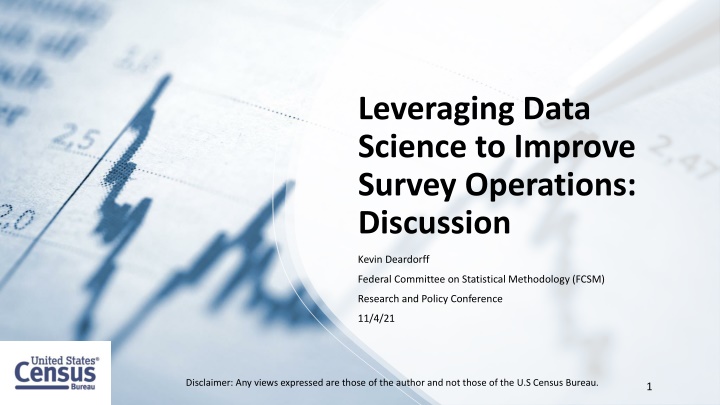
Improving Survey Operations Through Data Science Strategies
Explore strategies for leveraging data science to enhance survey operations in governmental programs. Learn about building successful teams, identifying roadblocks, defining success measures, developing modular solutions, and planning iterative exchanges. Discover diverse reasons for data science applications and ways to drive innovation and efficiency.
Download Presentation

Please find below an Image/Link to download the presentation.
The content on the website is provided AS IS for your information and personal use only. It may not be sold, licensed, or shared on other websites without obtaining consent from the author. If you encounter any issues during the download, it is possible that the publisher has removed the file from their server.
You are allowed to download the files provided on this website for personal or commercial use, subject to the condition that they are used lawfully. All files are the property of their respective owners.
The content on the website is provided AS IS for your information and personal use only. It may not be sold, licensed, or shared on other websites without obtaining consent from the author.
E N D
Presentation Transcript
Leveraging Data Science to Improve Survey Operations: Discussion Kevin Deardorff Federal Committee on Statistical Methodology (FCSM) Research and Policy Conference 11/4/21 Disclaimer: Any views expressed are those of the author and not those of the U.S Census Bureau. 1
Diverse Reasons for Data Science Applications in Governmental Programs Cost and time savings Reduce burden and increase quality For respondents For analysts Increase innovation Solution as a necessity Quick wins 2
Improving Survey Operations through Data Science Build the Team for Success Identify Roadblocks Early Define Measures of Success Develop Modular Solutions Plan for Iterative Exchanges 3
Build the Team for Success Embed data scientists into groups with subject matter knowledge Ensure transparency with cross-area or even cross-agency collaborations Share materials in a common space (GitHub) Identify measures of success 4
Identify Roadblocks Early Support training (often free and online) for staff Leverage Cloud-based processing solutions Identify areas where technological advances may create the need for new agency policy 5
Define Measures of Success More timely, granular data Higher quality data Cost avoidance Burden reduction on respondents and analysts Other opportunities for staff 6
Develop Modular Solutions Best solutions are designed for reuse Avoid tailored, one off solutions Take advantage of existing work the goal should be collaboration Implement solutions in stages Identify quick wins to build enthusiasm and support 7
Plan for Iterative Exchanges Meet respondents where they are Recognize the value of user feedback Take advantage of data in the wild Encourage exchanges with open-source tools 8
Lessons Learned from Census Often no dedicated funding to support these efforts Consider smaller, reimbursable projects as pilot/proof of concept opportunities Expect to be flexible and clever Think incrementally Go in with eyes wide open 9
Summary Census has quickly shown success on a diverse group of programs using data science solutions Many different types of projects are ideally suited for data science interventions Incremental solutions engage staff, create positive momentum, and build credibility for data science solutions Don t be afraid of failure 10
Contact Information Email: Kevin.E.Deardorff@census.gov LinkedIn: Kevin Deardorff 11
